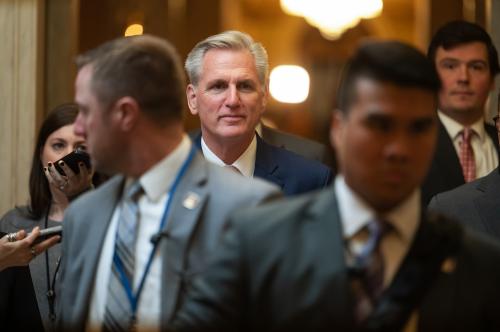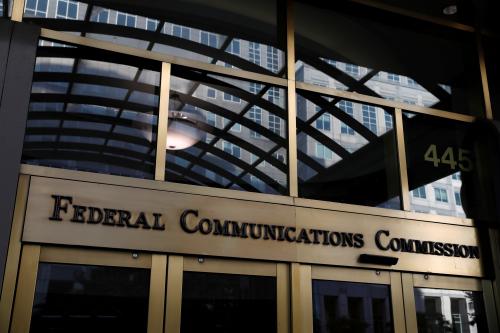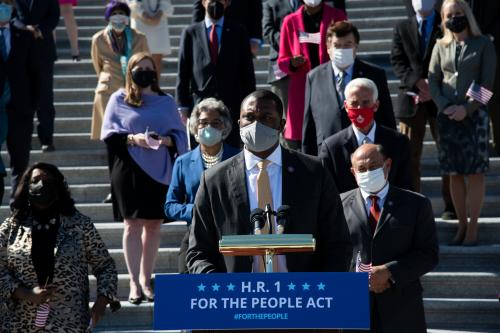On November 5, when it looked like Republicans had retained its Senate majority, there was a news report that “a source close to McConnell tells Axios a Republican Senate would work with Biden on centrist nominees but no ‘radical progressives’ or ones who are controversial with conservatives.” The article went on to note a GOP-controlled Senate would force Biden to have “a more centrist Cabinet” and would preclude Biden from appointing left-of-center officials in federal agencies.
A week later, though, that declaration looks premature. A Georgia law requiring Senate candidates to reach a 50 percent threshold means that two Senate races in that state are headed to a January 5 runoff election that would decide party control of the Senate. Based on what happens in those contests, there could be a 50-50 Senate where Vice President-elect Kamala Harris breaks the tie in favor of Democrats, or a 52-48 or 51-49 chamber in favor of Republicans.
The consequences of these competing scenarios for public policy in general would be enormous but also crucial in terms of technology policy. There would be dramatic ramifications for Biden’s Cabinet choices, agency appointments, and policy options in terms of antitrust enforcement, competition policy, infrastructure investment, privacy, Section 230 reforms, regulation, tax policy, and relations with China. Unless one or two Republican Senators sided with unified Democrats on particular issues, a GOP Senate likely would block progressive action and force Biden more to the political middle on a whole host of matters.
On antitrust questions, progressive House Democrats hoped for a major rewrite of the country’s internet platform rules that would restrain the ability of large tech companies to engage in predatory practices and unfair competition. With a GOP Senate, the odds of such an outcome are quite low. Biden still could pursue Department of Justice lawsuits against large tech companies, but it would be harder to rewrite the rules of the game.
A similar logic applies to prospects for a national privacy law. While it is not out of the question that California’s tough privacy law plus follow-up action by other states could encourage Congress to enact legislation, working out issues regarding the right to sue and state preemption controversies would be easier with a Democratic President, House, and Senate than divided party control. In the latter situation, Biden would have to find a few Senators willing to buck their party and vote with him to resolve those issues. Such a coalition could happen, but these kinds of negotiations always are lengthy and complicated.
Section 230 reforms may be one of the issues that move forward even in a divided Congress. The reason is both Republicans and Democrats have grievances against Big Tech. Republicans are upset about alleged ideological biases on the part of large platforms, while Democrats are unhappy about human trafficking, use of platforms to advertise opioids, and other abuses. The shared sense of grievance between members of the two parties could form the basis of a compromise bill that would remove or scale back the legal liability exemption in selected areas, similar to what Congress did on the Stop Enabling Sex Trafficking bill passed in 2018. Activities that further racial bias, enable opioid abuse, or incite violence could be candidates for legal carve-outs.
Another prime area for congressional action under divided control would be infrastructure investment. President-elect Biden already has discussed his interest in a major bill in this area that would address problems of highways, bridges, dams, broadband, and digital infrastructure. The goal would be to close the digital divide and aid underserved communities through improved broadband. There are agency actions that could make meaningful progress to help vulnerable communities.
The two parties are likely to agree on a tough line on China. The public climate has shifted markedly against China in recent years with both legislators and the general public wanting fairer trade policies, enhanced security, and a stronger emphasis on human rights. President-elect Biden will likely set up a clear process and a coherent strategy to move U.S. policy in these directions. With substantial control of diplomatic processes and trade negotiations, there are a number of things he can do on his own, such as tightening export controls, demanding fairer treatment of religious minorities, and addressing trade imbalances.
Finally, if Republicans retain control of the Senate, President-elect Biden can make desired policy changes through executive orders. In the same ways that Presidents Barack Obama and Donald Trump did, Biden has considerable discretion to enact new rules through presidential orders, agency enforcement, and departmental discretion over appropriated money.
Through those vehicles, President-elect Biden has many arrows in his quiver that will make him a strong and impactful leader. He can overturn his predecessor’s initiatives in the areas of digital access, personal privacy, data aggregation, cybersecurity, cell tower siting, high-skilled work visas, for-profit learning platforms, telemedicine, energy efficiency, broadband non-discrimination, and paid prioritization of internet traffic. What he does through executive orders likely will be more impactful than bills he is able to move through a divided Congress.









Commentary
What divided control of Congress would mean for President-elect Biden
November 9, 2020